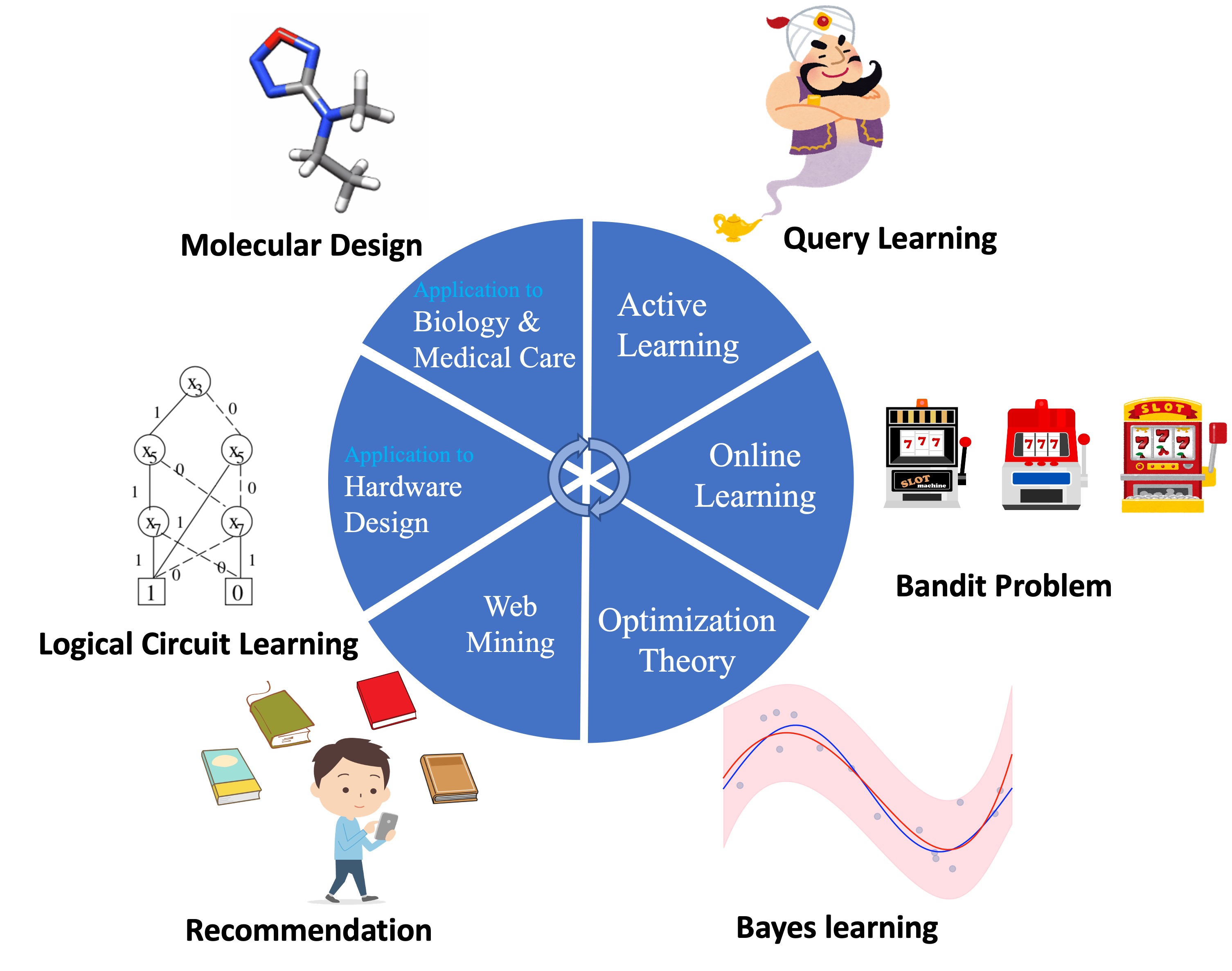
Theoretical Researches on Machine Learning
Online Learning
Our life can be seen as repetitions of an action and recieving its feedback for the objective of cumulative reward maximization (Though we sometimes act not for our own profit (^^;;)). Online learning is such way of learning that repeats deciding the next action based on the history of past actions and rewards or losses for them in order to maximize cumulative reward or minimize cumulative loss. In this era when systems can know users’ actions immediately, online learning technology is necessary for providing optimal services responding to users’ behaviors. We are developing performance-guaranteed algorithms and analyzing performance limitations in the settings that formalize real-world problems with various restrictions on obtainable information and with various objective functions to maximize or minimize.
Active learning
Do you know a demon called Akinator who can read your mind. Akinator asks you a small number of questions and always successfully guess what famous person or character you are thinking. Why can Akinator correctly guess what you are thinking with a small number of questions? Active learning is a theory that pursues what are the most suitable questions to correctly guess (your mind) with a small number of questions. In machine learning, the most popular learning framework is passive learning in which we are given data that are assumed to be generated according to some fixed distribution. Active learning, however, iteratively asks the target function value of the next data point that is optimal to improve the current hypothesis, as a result, it enables learning from a small number of data points. There have been studies on classical experimental design, methods using Bayes estimation and query learning in computational learning theory in the area of active learning.
Practical Researches on machine Learning
Web Mining
Nowadays, we can access various information such as person’s behavior history and sensor information through the Internet due to the spread of Internet. Learning from such information, technologies that display advertisements and recommend goods suitable for each person, and detect fraud, have been developing. Learning technologies useful for such developments are online learning and active learning. Online learning enables construction of systems that update current hypothesis so as to fit the objective using data obtained sequentially, and adapt to changing preferences or trends. Active learning can be used to improve recommendation performance for new users. Development of fast algorithms is also important because Web systems have many users.
Application to Hardware Design
Machine learning boom has lasted for recent years, and demand for its technology has become very large. Machine learning technology like deep learning, however, needs a lot of computational resources, so high performance machines must be prepared, which takes large cost and prevents the technology from being used in edge devices having small computational resources. Specialized hardware enables high speed machine learning, but its realization using limited hardware resources needs technologies of learning compact classifiers and predictors. We are developing learners and adaptive predictors that work under such limited hardware resources.
Application to Biology & Medical Care
We study realization of faster Raman spectra cancer diagnosis by using algorithms for bandit problems, extraction of repetitive sequences from DNA sequences by using pattern mining algorithms, and so on.
Raman spectra are scattered light obtainable by irradiating light on molecules. Raman spectra are known to be specific to molucles, so it is said that cancer cells can be differentiated from normal cells by their Raman spectra. In many cancer diagnosis, cancer cells are discriminated by their shape, but there are cancers like follicular carcinoma of thyroid that are difficult to diagnose by their shape. For such cancers, Raman spectra diagnosis is believed to be effective, but Raman scattering is very weak, so one Raman spectra measurement takes a few seconds. Furthermore, since two dimensional measurement is difficult, iterative measurement by shifting positions is needed, as a result long time is needed to obtain one Raman image of cells. As a countermeasure of this issue, we are studying the way of realizing faster cancer diagnosis by interactive measurement deciding the next measure points using an algorithm for a bandit problem. This theme is studied in the project leaded by Prof. Komatsuzaki.
